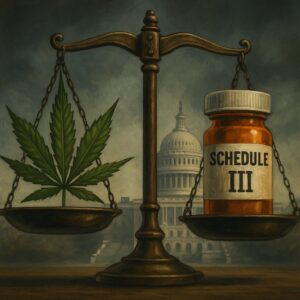The conversation around Schedule III Cannabis reform is electric with a single, game-changing proposal: moving cannabis from Schedule I to Schedule III of the Controlled Substances Act. Depending on who you ask, this is either the historic victory that unlocks the industry’s potential or a Trojan horse designed by “Big Pharma” to dismantle the state-legal markets we know today.
As the video astutely points out, both of these narratives are fueled by political grandstanding and fear. The truth, as is often the case with federal law, is far more nuanced, complicated, and significantly less dramatic.
This post will delve deep into the legal realities of what rescheduling cannabis actually means. We will go beyond the talking points, fact-check the claims using the federal laws at the heart of the issue, and provide a clear, authoritative analysis of who wins, who loses, and what this pivotal move truly means for the future of cannabis in America.
Understanding the Current Landscape: What is a Schedule I Drug?
To grasp the significance of rescheduling, we must first understand the legal prison cannabis has been in for over 50 years. The Controlled Substances Act (CSA), specifically 21 U.S.C. § 812, establishes five “schedules” to classify drugs based on their potential for abuse and accepted medical use.
Schedule I is the most restrictive category, reserved for substances that meet three specific criteria:
-
The drug has a high potential for abuse.
-
The drug has no currently accepted medical use in treatment in the United States.
-
There is a lack of accepted safety for use of the drug under medical supervision.
Placing cannabis in this category lumps it in with drugs like heroin and LSD, creating a direct conflict with the 38 states that have legalized medical cannabis. This federal classification is the root of nearly every major problem the legal cannabis industry faces, from banking restrictions to crippling tax burdens.
The “Historic Win” Narrative of Schedule III Cannabis: Unpacking the Positives
Advocates for rescheduling are right to call this a landmark moment. A move to Schedule III would be a seismic shift in federal policy with tangible, immediate benefits.
A Landmark Symbolic Shift
 For the first time since the CSA was enacted, the federal government would formally acknowledge that cannabis has an accepted medical use. This is not just symbolic; it chips away at decades of stigma and provides political cover for further reform. States with restrictive laws may feel emboldened to create or expand medical cannabis programs, knowing they are no longer in direct opposition to the federal government’s official stance on the plant’s medical value.
For the first time since the CSA was enacted, the federal government would formally acknowledge that cannabis has an accepted medical use. This is not just symbolic; it chips away at decades of stigma and provides political cover for further reform. States with restrictive laws may feel emboldened to create or expand medical cannabis programs, knowing they are no longer in direct opposition to the federal government’s official stance on the plant’s medical value.
The Billion-Dollar Question: Tax Relief Under IRC § 280E
The single most significant and undisputed “win” of rescheduling comes from the Internal Revenue Code. Section 280E of the tax code is a brutal, industry-crippling rule that states:
“No deduction or credit shall be allowed for any amount paid or incurred during the taxable year in carrying on any trade or business if such trade or business…consists of trafficking in controlled substances (within the meaning of schedule I and II of the Controlled Substances Act)…”
Because cannabis is a Schedule I substance, state-legal businesses are barred from deducting ordinary and necessary business expenses like rent, payroll, and marketing. This forces them to pay taxes on their gross profits, not their net income, leading to effective tax rates that can exceed 70%.
Rescheduling to Schedule III would immediately render Section 280E inapplicable to cannabis businesses. The law explicitly applies only to Schedule I and II substances. This change would be a massive financial lifeline, allowing companies to become profitable overnight, reinvest in their operations, lower prices for consumers, and function like any other legal business in the country.
Unlocking Medical Research
The video correctly highlights that a Schedule I designation has severely hampered scientific research into cannabis. Researchers face immense bureaucratic hurdles to obtain the necessary approvals and federal funding. Moving cannabis to Schedule III would streamline this process, removing many of the barriers that have prevented scientists from fully exploring the plant’s therapeutic potential. This could lead to a new era of cannabis research, potentially resulting in new medicines and a deeper understanding of its effects.
The “Trojan Horse” Narrative: Examining the Skeptics’ Fears
On the other side of the debate are the alarmists, who believe rescheduling is a trap. Their fears, while perhaps overstated, are rooted in legitimate legal complexities that the “win” narrative often ignores.
The Prescription Drug Problem: The FDCA vs. State Dispensaries
The central argument against rescheduling revolves around a different federal law: the Federal Food, Drug, and Cosmetic Act (FDCA). This act governs how drugs, food, and cosmetics are produced and sold. Critically, it mandates that any substance marketed with claims of therapeutic or medical benefit must go through rigorous clinical trials and receive FDA approval.
When cannabis moves to Schedule III, it will be federally recognized as a medical substance. However, the cannabis flower, edibles, tinctures, and vapes sold in state-licensed dispensaries are not FDA-approved drugs. This creates a new legal paradox:
-
Under Schedule I: Dispensaries are trafficking in an illegal substance.
-
Under Schedule III: Dispensaries are trafficking in an unapproved prescription drug.
This means that while the DEA may be less of a threat, the FDA could step in and regulate these businesses out of existence. The fear is that the only entities with the resources to navigate the multi-billion-dollar FDA approval process are large pharmaceutical companies, potentially creating a market where only pharma-produced, pharmacy-dispensed cannabis products are legal. This scenario would effectively wipe out the thousands of growers, processors, and retailers that form the backbone of the current state-legal industry.
Will Big Pharma Take Over?
This is the million-dollar question. While a complete and immediate takeover is unlikely due to the sheer scale of the existing state markets and the political fallout it would cause, the long-term threat is real. An FDA-centric regulatory framework inherently favors large corporations with deep pockets. Rescheduling opens a legal pathway for these companies to enter the market with FDA-approved cannabis drugs, which could eventually squeeze out the smaller, state-licensed operators who cannot compete on that playing field.
The Sobering Reality: What Rescheduling Doesn’t Do
The most crucial part of this discussion is understanding the limitations of this administrative action. Rescheduling is not a silver bullet, and many of the industry’s biggest problems will remain untouched.
It Does NOT Legalize Interstate Commerce
The U.S. Constitution’s Commerce Clause gives the federal government the authority to regulate commerce between states. Because cannabis will remain a federally controlled substance, the prohibition on transporting it across state lines will remain firmly in place. This means the fragmented, state-by-state market will continue, preventing the industry from achieving the efficiencies of a national market. A grower in Oregon still won’t be able to legally sell their product to a dispensary in New York.
It Does NOT Solve Banking (Completely)
The video correctly notes that banking issues aren’t magically fixed. Financial institutions are governed by strict federal regulations like the Bank Secrecy Act (BSA) and various anti-money laundering (AML) laws. While rescheduling to Schedule III might make banks feel slightly more comfortable, they would still be servicing businesses that are technically violating the FDCA.
The only comprehensive solution to the cannabis banking crisis is federal legislation like the SAFER Banking Act, which would provide a legal safe harbor for banks to work with state-licensed cannabis businesses without fear of federal reprisal.
It Does NOT End the State vs. Federal Conflict
Rescheduling simply changes the nature of the federal-state conflict; it does not resolve it. State medical and adult-use programs will still operate under a cloud of federal illegality, albeit a less threatening one. This lingering uncertainty will continue to deter institutional investment and create legal headaches for businesses and consumers alike.
The Role of Congress: The Only Path to True Legalization
This brings us to the most important takeaway: administrative rescheduling is a temporary fix, not a permanent solution. It is, as the video implies, a form of political duct tape on a problem that requires a new roof.
The fundamental issues plaguing the cannabis industry can only be solved through Congressional action. True legalization requires passing a law that creates a federal framework for cannabis regulation. This framework would need to:
-
Remove Cannabis from the CSA: Deschedule it entirely, treating it like alcohol and tobacco.
-
Establish a Federal Tax and Regulatory System: Create rules for licensing, safety, and taxation at the federal level.
-
Protect State Programs: Ensure that states retain the right to regulate or prohibit cannabis within their own borders.
Until Congress acts, any administrative measure will be a half-measure, leaving the industry vulnerable and the legal landscape confusing.
Conclusion: So, Is It a Win or a Scam?
The rescheduling of cannabis to Schedule III is neither a complete victory nor a nefarious scam. It is a pragmatic, incremental step forward that represents the most significant progress in federal cannabis policy in over 50 years.
-
It is an undeniable WIN for existing cannabis businesses, who will see immediate and massive relief from the 280E tax burden. It is also a win for researchers and patients who will benefit from increased study and reduced stigma.
-
It is a POTENTIAL TRAP in the long run if Congress fails to act. The threat of FDA overreach and a pharmaceutical takeover is real, and the legal status of state-licensed dispensaries will remain unresolved.
The real game is political theater. This move allows the current administration to claim a major victory on cannabis reform without having to do the hard legislative work. It kicks the can down the road, placing the responsibility squarely on a divided and often gridlocked Congress.
The fight is not over. It has just entered a new, more complex chapter.





